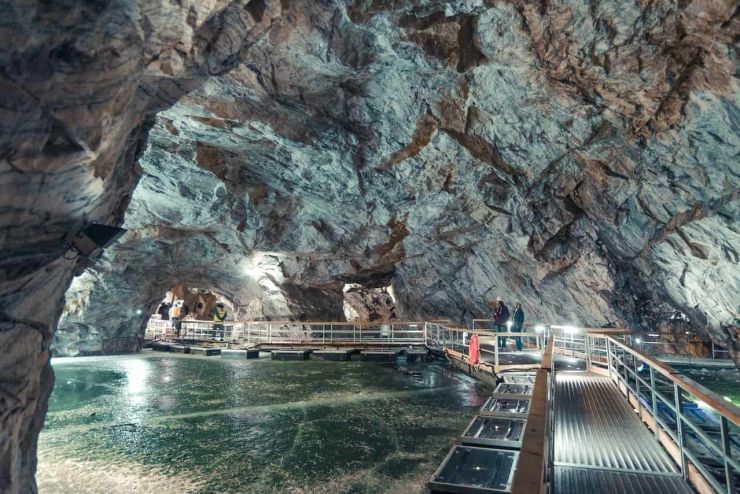
Highest Paying Geology Jobs in Nigeria 2024
Geology is a fascinating and rewarding field of study that deals with the Earth's structure, composition, and history.
It is also one of the most lucrative professions in Nigeria, with a range of high-paying jobs available for graduates.
In this article, we will identify the top 10 highest paying geology jobs in Nigeria, including information on each job and why readers should consider them.
Highest Paying Geology Jobs in Nigeria 2024 - Top 10
1. Geophysicist
A geophysicist is a scientist who studies the physical properties of the Earth, such as gravity, magnetism, and seismic activity. They use advanced technologies to map and analyze these properties, which are critical in exploring for oil and gas reserves.
Geophysicists also study natural hazards such as earthquakes, tsunamis, and volcanic activity, and work to develop strategies to mitigate their impact on populated areas. They may also study climate change by analyzing changes in the Earth's magnetic field and other properties.
They work in a variety of industries, including oil and gas exploration, mining, and environmental consulting, as well as in academia and government agencies. A degree in geophysics or a related field, such as physics or earth science, is typically required to pursue a career as a geophysicist.
Geophysicists are in high demand in the oil and gas industry, and their salaries can range from N100,000 to N350,000+ per month, depending on their experience and qualifications.

2. Petroleum Engineer
Petroleum engineers are responsible for designing and developing methods to extract oil and gas from the ground. They work closely and have experience in geology, to locate and assess reserves, and then design drilling and extraction methods to maximize production.
They use advanced technology and software to analyze data and create models to determine the best drilling location, well depth, and well orientation. They also develop plans to protect the environment and ensure safety during the drilling and extraction processes.
These engineers are also responsible for monitoring the production process once drilling has begun. They analyze production data and make adjustments to improve efficiency and optimize recovery rates. In addition to designing and overseeing drilling operations, petroleum engineers also work on drilling equipment and tools, and provide advice on the purchase and use of equipment.
Petroleum engineers must have strong problem-solving skills, an understanding of geology and geophysics, and knowledge of drilling technology and equipment. They typically have a degree in petroleum engineering, mechanical engineering, or a related field.
Petroleum engineers can earn between N280,000 and N1,200,000+ per month, depending on their level of expertise.
3. Exploration Geologist
Exploration geologists are involved in the initial stages of finding and assessing new mineral and hydrocarbon deposits. They analyze geological data to identify areas that are likely to contain valuable resources, and then plan and conduct field investigations to confirm the presence and quality of these resources.
Exploration geologists use a range of techniques to gather geological data, including satellite imagery and airborne surveys, as well as ground-based techniques such as drilling, geological mapping, and sampling. They also analyze data from previous mining and drilling operations in the area.
Once potential resource deposits have been identified, exploration geologists plan the next phase of exploration, which can involve drilling test holes, conducting geophysical surveys, and analyzing soil and rock samples. They use this information to assess the size, quality, and potential economic viability of the resource.
In addition to technical skills, successful exploration geologists have excellent problem-solving and critical thinking abilities, strong communication and teamwork skills, and a passion for fieldwork and travel. They may work for mining and oil companies, consulting firms, or government agencies, and may travel extensively to remote locations around the world.
Exploration geologists can earn between N350,000 and N1,000,000+ per month. Overall, one of the best geologist salaries offered in Nigeria.
Are you ready to take your career to the next level?
Nexford's Career Path Planner takes into account your experience and interests to provide you with a customized roadmap to success.
Receive personalized advice on the skills and qualifications you need to get ahead in areas like finance, marketing, management and entrepreneurship.
4. Mining Engineer
Mining engineers design and oversee the construction and operation of mines, including open-pit and underground mines. They work closely with geologists to identify mineral deposits and then develop methods to extract them safely and efficiently.
Mining engineers are responsible for designing and implementing mining plans, developing mine infrastructure, and ensuring the safety of workers and the environment. They also manage mining operations, including equipment selection, production scheduling, and maintenance.
To become a mining engineer, individuals typically need a bachelor's degree in mining engineering or a related field such as geological engineering, civil engineering, or environmental engineering.
Additionally, some states require mining engineers to be licensed. In addition to technical skills, mining engineers also need strong communication, leadership, and problem-solving skills to effectively manage mining operations and work with a variety of stakeholders, including government regulators, community members, and industry partners.
As the demand for minerals continues to grow, mining engineers will play a critical role in ensuring responsible and sustainable resource extraction.
Mining engineers can earn between N150,000 and N435,000+ per month, depending on their experience and qualifications.

5. Hydrogeologist
Hydrogeologists study the movement and distribution of groundwater, which is essential for human consumption, agriculture, and industry. They use a range of techniques to assess the quantity and quality of groundwater, and then design and implement management strategies to ensure its sustainable use.
Hydrogeologists collect and analyze data from wells, aquifers, and various other sources to understand how water moves through the earth's surface and subsurface layers. They use tools such as hydrological models, geographic information systems (GIS), and remote sensing technologies to create maps and visualize groundwater resources.
One of the critical roles of hydrogeologists is to ensure the safety of groundwater for human consumption. They look for potential sources of contamination and develop strategies to mitigate them. They also monitor wells and aquifers to identify changes in water quality and quantity, working with local communities and authorities to develop solutions to conserve water resources.
Hydrogeologists also work with industries that extract water for their operations, ensuring that they use water in a sustainable manner. They evaluate the potential effects of industrial activities on groundwater quality and develop and implement pollution prevention and management strategies.
Overall, hydrogeology plays a crucial role in managing our primary source of freshwater. Through their work, hydrogeologists help ensure that we have access to safe drinking water now and in the future while balancing the needs of various stakeholders.
Hydrogeologists can earn between N250,000 and N600,000+ per month.
6. Environmental Geologist
Environmental geologists study the interaction between human activities and the natural environment, with a focus on identifying and mitigating potential hazards. They analyze soil, water, and air samples to assess contamination levels, and then develop and implement remediation plans to clean up polluted sites.
Environmental geologists also study natural disasters such as earthquakes, landslides, and tsunamis, and assess the potential risks associated with these events. They may also work with urban planners and engineers to ensure that construction projects are built in safe and environmentally responsible ways.
Additionally, environmental geologists may work for government agencies or non-profit organizations to develop policies and programs aimed at protecting the environment and promoting sustainable practices.
Environmental geologists can earn between N250,000 and N800,000+ per month.

7. Geotechnical Engineer
Geotechnical engineers study the behavior of soils and rocks, with a focus on designing structures and foundations that can withstand the forces of nature. They analyze geological data to assess the stability of sites, and then design and oversee construction projects to ensure their safety and durability.
Geotechnical engineers work on a wide range of projects, including buildings, bridges, highways, tunnels, dams, and coastal structures. They often work with other engineers and construction professionals to ensure that structures are designed and built to meet the specific needs of a project.
Geotechnical engineers use a variety of techniques to assess the properties of soils and rocks. They may conduct field tests to measure soil or rock properties, such as strength, stiffness, and permeability. They may also perform laboratory tests on soil or rock samples to determine their composition and behavior under different conditions.
Once they have gathered and analyzed data, geotechnical engineers develop design recommendations for structures and foundations. They may use computer programs to simulate the behavior of structures under different loading conditions, or to model the long-term behavior of soil and rock formations.
Geotechnical engineers are also responsible for overseeing construction projects to ensure that structures are built according to design specifications. They may provide on-site supervision during excavation and foundation work, and may conduct tests to ensure that structures are constructed to withstand the forces of nature.
Overall, geotechnical engineering is a crucial field that plays a key role in ensuring the safety and durability of infrastructure projects. By studying the behavior of soils and rocks and designing structures and foundations to withstand the forces of nature, geotechnical engineers help to prevent disasters and make our built environment safer and more resilient.
Geotechnical engineers can earn between N170,000 and N500,000+ per month.
8. Geochemist
Geochemists study the chemical composition of rocks, minerals, and fluids, with a focus on understanding the Earth's chemical cycles and the distribution of elements. They use advanced laboratory techniques to analyze samples and then interpret the data to provide insights into geological processes.
Geochemists also study the behavior of elements in the environment, including their movement through soil, water, and air. They apply their knowledge to environmental issues such as pollution, water quality, and climate change. In addition, geochemists explore the chemistry of extraterrestrial materials, such as meteorites and moon rocks, to gain insight into the formation and evolution of the solar system.
Geochemistry is an interdisciplinary field that draws on principles from geology, chemistry, and physics. Geochemists work in a variety of settings, including research laboratories, government agencies, and the mining and petroleum industries. They may also work as consultants, providing expertise on environmental issues or mineral exploration.
Geochemists can earn between N200,000 and N600,000+ per month, depending on their experience and qualifications.
9. Reservoir Engineer
Reservoir engineers are responsible for managing oil and gas reservoirs, with a focus on maximizing production and recovery rates. They use advanced simulation software to model the behavior of reservoirs and then design and implement production strategies to optimize their performance.
Reservoir engineers also analyze data from drilling and production operations to make informed decisions about drilling locations, well placement, and reservoir management. They collaborate with other professionals, such as geologists and drilling engineers, to assess the economic viability of oil and gas reserves and determine the best approach for extracting them.
To be successful in this role, reservoir engineers require a strong foundation in mathematics, physics, and geology. They must also have strong analytical skills and the ability to solve complex problems using advanced technology and techniques. Good communication skills are also critical, as they must explain technical information to non-technical stakeholders.
The job outlook for reservoir engineers is strong, with the demand for skilled professionals expected to grow in the coming years. A degree in petroleum or chemical engineering is typically required, along with relevant experience in the oil and gas industry. Professional certifications, such as the Society of Petroleum Engineers' Petroleum Engineering Certification, can also improve job prospects and earning potential.
Reservoir engineers can earn between N300,000 and N800,000+ per month, depending on their level of expertise.

10. Geology Professor
Geology professors are educators who teach courses in geology at universities and colleges. They are also involved in research activities and may publish scholarly articles and books. Geology professors typically have a master's or PhD degree in geology or a related field, as well as a strong passion for the subject matter.
They may teach courses ranging from introductory geology to advanced topics such as petrology, mineralogy, and structural geology. They may also supervise student research projects and advise graduate students.
In addition to teaching, geology professors conduct research on a variety of topics related to the study of the Earth's surface and subsurface features. This may involve fieldwork, laboratory analysis, and the use of sophisticated equipment such as seismic imagining technology. They may also participate in interdisciplinary research collaborations with other scientists, such as environmental scientists, hydrologists, and climatologists.
Geology professors may also engage in outreach activities to promote the field of geology and the importance of geological research. This may involve giving public lectures, participating in community events, and working with local schools to develop educational programs related to geology.
Overall, geology professors play a critical role in educating the next generation of geologists and advancing our understanding of the Earth's geological processes.
Geology professors can earn between N200,000 and N500,000 per month, depending on their level of experience and the institution they work for.
Conclusion
In summary, geology offers a range of high-paying job opportunities in Nigeria, with salaries ranging from N100,000 to N1,200,000 per month.
Geophysicists, petroleum engineers, exploration geologists, mining engineers, hydrogeologists, environmental geologists, geotechnical engineers, geochemists, reservoir engineers, and geology professors are all in demand in various industries, including oil and gas, mining, environmental consulting, academia, and government agencies.
Readers interested in pursuing a career in geology should consider their interests and skills and choose a specialization that aligns with their goals. They should also seek out relevant education and training opportunities, such as a degree in geology or a related field, internships, and professional certifications.
With hard work and dedication, they can pursue a rewarding and fulfilling career in geology in Nigeria.
Looking to expand your skillset and get a high-paying geology career?
Discover how you can acquire the most in-demand skills with our free report, and open the doors to a successful career. Download the free report today!
Want to take your geology career even further? Consider how a BBA or MBA can help you develop these skills and increase your earning potential by showing you the skills to become an effective manager.
FAQs
What skills do I need to have to pursue a high-paying geology job in Nigeria?
To pursue a high-paying geology job in Nigeria, you should have a strong foundation in geology and related fields such as physics, chemistry, and mathematics. You should also have excellent problem-solving, analytical, and critical thinking skills, as well as effective communication and teamwork abilities.
Learn how to develop the most in-demand skills for your future career!
Discover how you can acquire the most in-demand skills with our free report, and open the doors to a successful career.
What kind of degree do I need to work in a high-paying geology job in Nigeria?
Most high-paying geology jobs in Nigeria require at least a bachelor's degree in geology or a related field. However, some positions may require a master's degree or a Ph.D. degree, depending on the job responsibilities and industry requirements.
How can I gain experience in geology in Nigeria?
You can gain experience in geology in Nigeria by pursuing internships, apprenticeships, or entry-level jobs in the geology field. You can also participate in research projects, attend conferences and workshops, and pursue professional certifications to enhance your skills and knowledge.
What industries can I work in with a geology degree in Nigeria?
With a geology degree in Nigeria, you can work in various industries such as oil and gas, mining, environmental consulting, academia, and government agencies. The specific job opportunities and salaries may vary depending on the industry, company, and job responsibilities.
Are there any challenges to working in high-paying geology jobs in Nigeria?
Yes, like any other profession, high-paying geology jobs in Nigeria come with their own challenges. For instance, some jobs may require working in remote locations, extreme weather conditions, or challenging terrains. Additionally, the competition for these positions can be fierce, and you may need to acquire advanced skills and experience to stand out from other candidates.
How can I improve my chances of getting a high-paying geology job in Nigeria?
To improve your chances of getting a high-paying geology job in Nigeria, you should pursue relevant education and training, gain practical experience, network with professionals in the field, and stay updated with the latest industry trends and technologies. You should also develop a strong resume and cover letter that highlights your skills, accomplishments, and potential value to the employer.
Looking to expand your skillset and get a high-paying geology career?
Discover how you can acquire the most in-demand skills with our free report, and open the doors to a successful career. Download the free report today!
Want to take your geology career even further? Consider how a BBA or MBA can help you develop these skills and increase your earning potential by showing you the skills to become an effective manager.

Known for strategy and attention to detail
Joe has more than 10 years of marketing experience, working within the public sector, client-side, and agency side.
He is passionate about using data and customer insights to improve marketing performance.
Join our newsletter and be the first to receive news about our programs, events and articles.